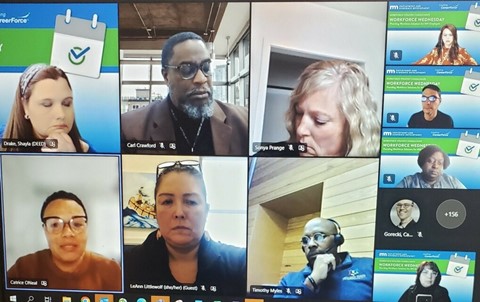
In the first Workforce Wednesday of 2023, the DEED Workforce Strategy Consultant team led an engaging virtual discussion about where employers can still make an impact in filling workforce needs – even in our tight labor market – with a focus on reaching Minnesotans underrepresented in the workforce. DEED Labor Market Analyst Carson Gorecki provided an overview of the state of the workforce, which highlights those who face employment barriers and who are experiencing the highest unemployment. Black, Indigenous and People of Color looking for work could help employers fill workforce needs, if employers focus on providing equitable access to opportunities. Panelists discussed how lack of access leads to employment disparities and shared how employers can reach out to Minnesotans underrepresented in the workforce. They also shared recommendations for including and retaining a diverse workforce, which leads to positive business and community outcomes.
Here are a few key takeaways from the panelists in response to various questions during the discussion:
Carl Crawford, Human Rights Officer, City of Duluth:
What key advice would you give to employers? Where should they start? What are the easy wins, so to speak?
- Reach out to DEED for data assistance or do a deep dive with IDI (Intercultural Development Inventory). Understand your company. Everybody has a narrative, but data doesn't lie, the truth will be there.
- Understand the subculture within your business and outside of your business. Who you are in the community makes a big difference and a big impact.
- Build relationships with underserved communities to build your future workforce. How do you show up to those communities that are underrepresented, when do you show up? All of that has an impact. Are you supporting the little league baseball team in your community? Do they know who you are, and more importantly that you care?
- Employees today are savvy – if you are not going to be about them, they are not going to be about you.
Tim Myles, St. Louis County, St. Louis County BIPOC Leadership Team:
What key advice would you give to employers? Where should they start? What are the easy wins, so to speak?
- There are a number of areas employers should focus on: leadership, hiring process, retention and budgeting.
- Having the opportunity for leadership to understand Diversity, Equity and Inclusion (DEI) and being able to understand people's differences and understand it's okay to have the differences.
- Then the hiring process – make sure the hiring process doesn't have biases in it. This also gives those seeking promotions the opportunity to advance without barriers.
- Retention: try to understand what barriers people who work for you face day to day. Try to understand viewpoints from workers' perspectives. For example, have diverse representation on hiring committees, including those for promotions, so diverse viewpoints are represented.
- DEI in the budgeting process: you need to set aside money to recruit and train diverse staff.
LeAnn Littlewolf, Co-Executive Director, American Indian Community Housing Organization (AICHO):
How should we define the difference between equity and equality in the workforce?
- Equity addresses the question of equality. If we don't have equal access, then equity is the way we address that, we look at the root causes, what are those challenges?
- Equity is about problem solving, so how do we help everyone have equal access, understanding that there are different circumstances and scenarios and historical context.
- We need to think in a global context, and we also need to think individually about what people are dealing with that prevents them from having equal access.
- An example: a local employer who wanted to hire Indigenous community members hired Native trainers, who spoke to people's experiences and historical trauma.
Catrice O'Neal, Workforce Development Program Director, Brooklyn Park and Brooklynk:
What are employers missing when they miss focusing on equity?
- We know that equity is providing people with what they need versus providing all people the same resources; we need to be intentional about investing in those resources that target equity.
- Lost opportunity is lumping equity and inclusion together – showing people that they are valued and included, which is low cost, versus investing in addressing barriers like training, child care, housing, which could help break down barriers.
- Hiring DEI managers but not allocating any budget to their work is another missed opportunity.
Sonya Prange, VP of HR and Service Operations, Intek Plastics:
Have you noticed any benefit programs that help attract and retain diverse candidates?
- What we found through general feedback is that 401(k), paid holidays and opportunities for development and advancement are key for diverse employment candidates.
- We have always had a high deductible, high Health Savings Account (HSA) contribution plan so we added another option that reduced the HSA contribution but also reduced the premium to increase options for employees.
- To remove barriers, we have interpretation services and 1:1 orientations to help get questions answered for those who don't speak English as their first language.
- We have benefit program packets translated into languages represented in our plant.
- We also do English as a Second Language (ESL) training onsite with customized content to go through benefits as well as other terms needed on the manufacturing floor.
View a recording of the January 4, 2023 session and other past sessions, find related downloadable resources and access a schedule for all Workforce Wednesday sessions in 2023 on the Workforce Wednesday page on CareerForceMN.com
